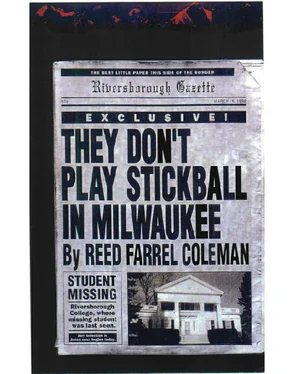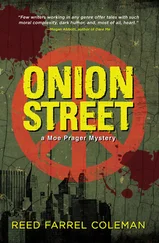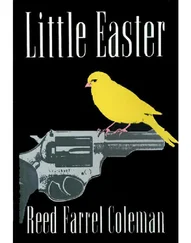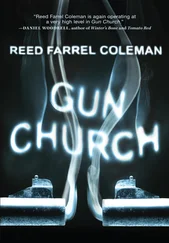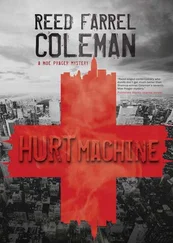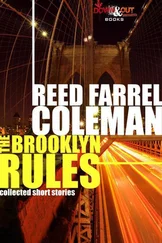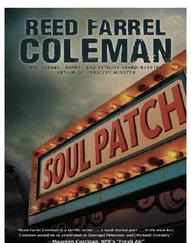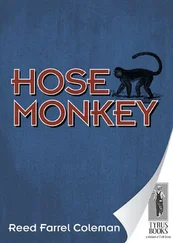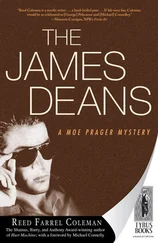Reed Coleman - They Don't Play Stickball in Milwaukee
Здесь есть возможность читать онлайн «Reed Coleman - They Don't Play Stickball in Milwaukee» весь текст электронной книги совершенно бесплатно (целиком полную версию без сокращений). В некоторых случаях можно слушать аудио, скачать через торрент в формате fb2 и присутствует краткое содержание. Год выпуска: 0101, ISBN: 0101, Издательство: The Permanent Press, Жанр: Криминальный детектив, на английском языке. Описание произведения, (предисловие) а так же отзывы посетителей доступны на портале библиотеки ЛибКат.
- Название:They Don't Play Stickball in Milwaukee
- Автор:
- Издательство:The Permanent Press
- Жанр:
- Год:0101
- ISBN:1579622984
- Рейтинг книги:5 / 5. Голосов: 1
-
Избранное:Добавить в избранное
- Отзывы:
-
Ваша оценка:
- 100
- 1
- 2
- 3
- 4
- 5
They Don't Play Stickball in Milwaukee: краткое содержание, описание и аннотация
Предлагаем к чтению аннотацию, описание, краткое содержание или предисловие (зависит от того, что написал сам автор книги «They Don't Play Stickball in Milwaukee»). Если вы не нашли необходимую информацию о книге — напишите в комментариях, мы постараемся отыскать её.
They Don't Play Stickball in Milwaukee — читать онлайн бесплатно полную книгу (весь текст) целиком
Ниже представлен текст книги, разбитый по страницам. Система сохранения места последней прочитанной страницы, позволяет с удобством читать онлайн бесплатно книгу «They Don't Play Stickball in Milwaukee», без необходимости каждый раз заново искать на чём Вы остановились. Поставьте закладку, и сможете в любой момент перейти на страницу, на которой закончили чтение.
Интервал:
Закладка:
“This the boy?” I showed her my wallet photo of Zak.
“That’s him. Sorry about that dorky college boy crack.”
“It’s forgotten. Listen, this girl we’re talking about, you ever catch her name?”
She was staring at me again. Why would I have to ask the name of someone I obviously knew?
“I know it’s a weird question, but humor me, please?”
“Well, mister, I ain’t the nosy type,” she said with a straight face.
“Oh, believe me, I know you’re not. It’s just that I worked as a waiter myself for a while and I overheard things I wasn’t trying to eavesdrop on. Come on. . Sandra,” I read her name tag. “As a favor to an old waiter, try and remember.”
Sandra screwed up her face for dramatic effect, but I don’t imagine she had to search her memory for more than a nanosecond. “Kiwi, Keela, I don’t know, foreign sounding like that.”
“Kira?”
“Sounds about right,” she nodded. “Can I get you anything else?”
I waved a fifty-dollar bill under her nose. “Is there a way out of this place other than the front door?”
“Through the kitchen, into an alley that leads to Beethoven Street.”
I handed Sandra the fifty. “Think you can arrange a tour of the kitchen for me?”
“For a handsome man like yourself,” Sandra purred, leering at me in a way she must have thought sexy, “I could arrange almost anything.”
“I might just take you up on that.” I kissed the back of her hand. “But for now, let’s see about the back door.”
With the fifty bucks worth of consolation, Sandra disappeared into the kitchen. She reappeared at my table within two minutes. Everything was arranged. I left a five on the table to cover breakfast.
“Listen,” I whispered to her as I stood up, “make like you’re pointing the way to the bathroom.” She did. “Great. Some men are going to come in asking about me in a few minutes. Whatever you do, swear to me that you won’t tell them I’m going back downstate for a few days.”
“I swear.”
As I trotted down the alleyway towards Beethoven Street, my legs were fueled by hope. Hope wasn’t something I was terribly familiar with, but it felt pretty damned fine. Now I needed some time, sans chaperones, to make certain my newfound hope wasn’t of the false variety. My exit through the kitchen was a start. And since I figured Sandra the waitress would confess as to my fraudulent travel plans within five minutes, I thought I could count on at least a few hours of unfettered activity.
My first stop was a ski shop. I grabbed a new parka, gloves, a turtleneck, pants, and a pair of hiking shoes off the shelf. I bought a wool ski hat-I hated hats-and a pair of those orange reflector sunglasses that make you look like an alien with no fashion sense. I hardly recognized myself. I doubted if anyone else would, not at first glance. When the salesman offered to put my peacoat out of its misery, I snapped at him. I had him box the clothes I’d come in with and paid for them to be shipped back to Sound Hill.
I strolled over to the campus under a bright sun. It was relatively warm and, for the first time since I’d arrived, snow wasn’t part of the forecast. That would help. Fewer students would be inclined to take the subterranean passageways between buildings. Now all I had to do was spot Kira and follow her without her noticing me. I took the high ground atop the library steps, watching.
Surveillance, boredom is thy name. I detested it. Hurry up and wait and wait and wait. It was the endless, often fruitless hours of loneliness that had helped push me out of insurance investigations. It was all about cold nights in cold cars drinking cold coffee. I used to think that Eliot had gotten it all wrong, life wasn’t about coffee spoons, but about coffee containers: I have known the ins, outs, downs and ups, I have measured out my nights with coffee cups.
But like MacClough used to say, “If you could quote T.S. fuckin’ Eliot, you were in the wrong job anyway.” He was right, of course.
I didn’t have to look at my watch to know an hour had passed. After doing enough surveillance, you gain intimate knowledge of the passage of time, the deathly slow march of it. Only in retrospect does time ever pass quickly. Besides, I was standing under the clock tower and the chimes were kind of hard to ignore.
By the second round of chimes, my more usual sense of pessimism had set in. I would never find Kira this way. For all I knew, she didn’t have class today. And I knew nothing for sure. For chrissakes, maybe she was an expensive hooker. I couldn’t recall the last time I felt so unsure of myself. I had forfeited control of my emotional life to desk clerks and chatty waitresses. I was so far removed from my original purpose that I doubted the value of getting involved. These things, I thought, were better left to hard men, men not so easily distracted.
I was on the downward spiral of negativity followed by self-recrimination. The anger and explosion would not be far behind. “Thanks Dad!” I said, wishing he could hear me. Noticing I was cold, I deserted my spot on the granite steps of the library.
The cafeteria wasn’t too difficult to find without a map. I poured myself the biggest container of coffee I could find. The fat, unsmiling woman at the register shook her head no at me.
“What’s the matter?” I gritted my teeth.
“That’s a soda container you got there. Can’t take coffee out of here in a soda container.”
“Charge me for it.”
“Can’t do that,” she explained. “Gotta get a coffee container.”
“Here’s five bucks, charge me whatever you want.”
“Can’t do-
“-that. Yeah, yeah, yeah.”
I left the coffee at the register and started for Dean Dallenbach’s office. I hadn’t wanted to go through him to find out about Kira, but now I didn’t see that I had a choice. I was wrong.
There she was, fifty feet in front of me, a distressed leather book bag strapped to her back. I slowed my pace and fell in behind a crowd of students arguing the merits of the Categorical Imperative. Wasn’t liberal arts grand? I hoped none of these kids planned on working for a living. As she moved, I moved. She came to rest in the third row, third seat from the front of room 203 of Snodgras Hall.
I couldn’t hear the lecture through the closed door, but figured it was an English class of some form or another. The professor’s salt-and-pepper hair was too long, falling on the shoulders of his green corduroy jacket. He strutted about, waving his arms like a hackneyed Hamlet, his eyes never straying too far from the prettiest women in class. I’d taken enough English courses to know that most literature professors were just frustrated actors with ids the size of Chicago. Okay, maybe some were frustrated writers. Id size remained constant.
At the end of the lecture I ducked into a nearby doorway and picked up on my shadowing routine. It went on like that until late in the afternoon. It wasn’t all bad, though. I did rather enjoy the live models in Kira’s sketching class. When the instructor shooed them out of the art room, I watched Kira disappear around a bend in the hallway. I failed to see the point in following her any longer. What would watching her sit through one more class prove? Yet, my doubts lingered. I was afraid to trust the obvious, that Kira was a student at Riversborough. I needed a little independent confirmation.
“Excuse me,” I called to Kira’s art instructor. “Can I have a word with you?”
“Sure.” She waved me up to the front of the class. She was a smallish woman with close-cropped brown hair and copper brown eyes. She had hollow cheeks smudged with charcoal and a friendly smile.
“Hi,” I put out my hand for a shake, but she showed me her blackened palms and we agreed that my gesture would suffice. “My name’s Dylan Klein.”
Читать дальшеИнтервал:
Закладка:
Похожие книги на «They Don't Play Stickball in Milwaukee»
Представляем Вашему вниманию похожие книги на «They Don't Play Stickball in Milwaukee» списком для выбора. Мы отобрали схожую по названию и смыслу литературу в надежде предоставить читателям больше вариантов отыскать новые, интересные, ещё непрочитанные произведения.
Обсуждение, отзывы о книге «They Don't Play Stickball in Milwaukee» и просто собственные мнения читателей. Оставьте ваши комментарии, напишите, что Вы думаете о произведении, его смысле или главных героях. Укажите что конкретно понравилось, а что нет, и почему Вы так считаете.
